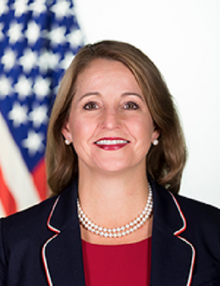
Exclusive
OMB’s new strategy gives agencies operational, tactical guide to increasing the value of federal data
Federal CIO Suzette Kent said in an exclusive interview that new federal data strategy helps build a mature, healthy and secure data sharing foundation.
Best listening experience is on Chrome, Firefox or Safari. Subscribe to Federal Drive’s daily audio interviews on Apple Podcasts or PodcastOne.
The Office of Management and Budget released the federal data strategy today giving agencies 40 goals to improve the accessibility, value and security of what many call the 21st Century’s new oil.

The strategy builds upon initiatives, policies, executive orders and laws that have underpinned federal data for the last 20 years.
Suzette Kent, the federal chief information officer, said the strategy gives agencies a host for the short and long-term goals of the federal data strategy.
“They are broken down to focus on some things for the 2019-2020 action plan that for a sequence standpoint are more critical to building the foundation for a mature, healthy and secure data sharing, but it also prioritizes some of the data sets that tie to some of the other executive orders and other critical activities that has been going on like artificial intelligence, financial management and geospatial,” Kent said in an exclusive interview with Federal News Network. “For agencies, it puts forth some specific actions for agencies to ensure they have a solid working foundation. That includes governance, infrastructure and staffing. The really mission-empowering and exciting thing is identifying what questions they want to answer and how they can support that.”
Kent said the strategy is fundamentally changing the way agencies use data to improve operations and deliver services as well as making it easier for citizens and businesses to access and use data to spur the economy.
The Office of Management and Budget’s policy breaks down the strategy across two main components:
- Principles — these include areas such as ethical governance, conscious design and creating a learning culture.
- Practices — these help agencies recognize and benefit from the value of the data by building a culture that values data and promotes public use; Governing, managing and protecting data; and Promoting efficient and appropriate data use.
Kent said in the short term, OMB wants agencies to focus on naming a chief data officer, creating governance structures to improve how data is used, made accessible and creating learning agendas as required by the Foundations for Evidence-based Policymaking Act.
Related Stories

Evidence-based policy bill passage sets stage for upcoming federal data strategy
Among the near-term deliverables are a data science training and credentialing catalog, data protection tool kits and improving the steps agencies take to make sure their data is more secure. Kent said OMB also will lead an effort to build a repository of the tools and best practices based on current agency efforts.
Kent said several agencies have chief data officers and data strategies today so bringing all the information together in one place will help accelerate these efforts governmentwide.
“There is a long list of things we aspire to do but we are being very tactical in where we need to start the journey and those are the things we will focus on in 2019 and 2020,” she said.
OMB asked for comments on the action plan by July 5.
Reaction to the data strategy has been positive.
Jonathan Alboum, public sector chief technology officer for Veritas and a former Agriculture Department CIO, said OMB’s timing of releasing the strategy is good because there is a lot of interest and focus on data.
“Agencies need to get their data exposed and shared because people want this stuff. I think there is a lot of demand for data and to make data accessible,” Alboum said in an interview. “I bet agencies are doing 40% of these practices naturally. Some of these other objectives will guide or redirect a little bit what they are doing today. But a lot of data collections already is happening so now there will be additional requirements to explain how agencies are using the data.”
Alboum said he was most excited not to see any mention of a chief data officer in the strategy.
“Responsibilities around data cut across the entire organization so having data stewardship being a core competency of everyone in the organization is a good thing. These concepts related to that are weaved in to the document,” he said.
At the same time, Alboum said the biggest challenge is for agencies to ensure the culture of data sharing is institutionalized.
“The idea of sharing is huge, but the culture is not always a sharing one,” he said. “We want to promote sharing. However, the policy doesn’t address what is being done to understand all the legal and regulatory impediments to sharing. There are missed opportunities for better sharing because of legislative or regulatory barriers. I think someone needs to look at that friction.”
Nick Hart, the CEO of the Data Coalition and a former policy and research director of the U.S. Commission on Evidence-Based Policymaking, said the strategy establishes a clear sense of long-term priorities for strengthening government’s data infrastructure and the action plan offers a clear set of discrete tasks that agencies can undertake right away.
“In the short-term, the strategy offers a consistent direction for government to move in for achieving early wins in making data more accessible and useful. It won’t solve all of government’s data management problems, but it’s a good start,” Hart said in an email to Federal News Network. “Long-term, the strategy sets an expectation that all agencies need to improve how they responsibly and ethically collect, manage, and use data. If the strategy and the action plan are successfully implemented, we’ll likely see substantial improvements in recognizing government data as an asset for our society.”
Copyright © 2025 Federal News Network. All rights reserved. This website is not intended for users located within the European Economic Area.
Jason Miller is executive editor of Federal News Network and directs news coverage on the people, policy and programs of the federal government.
Follow @jmillerWFED



